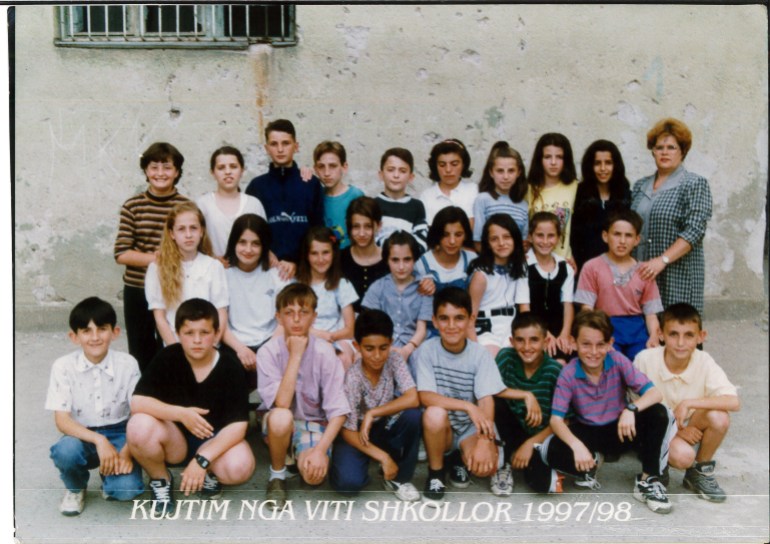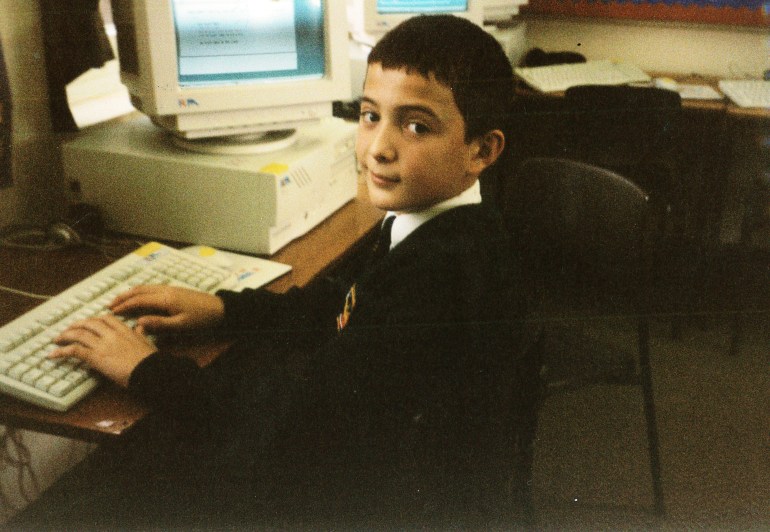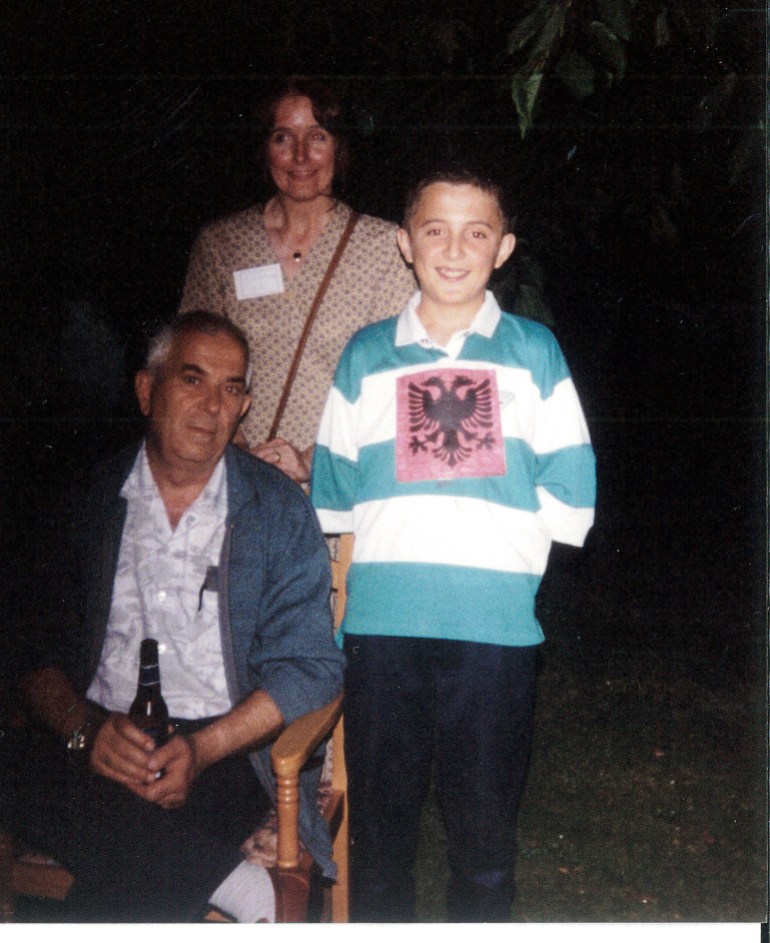‘An invisible badge’: How war changes children
‘In 1999, the war in Kosova stole my childhood. Now, I watch the same thing happening to children in Ukraine.’

The war will be over, one day.
Those are the words I’d tell myself, over and over again.
Keep reading
list of 4 itemsZelenskyy pushes allies for direct involvement in Ukraine’s war with Russia
Russian playwright and director go on trial over ‘justifying terrorism’
Russian court hands 25 years to arson plotter accused of Ukraine links
I was 12 years old and it was 1999 – the year I first heard the air raid siren.
Slobodan Milošević had been waging wars in various parts of Yugoslavia and now he had brought his killing machine to Kosova. Sometimes I could see black pillars of smoke billowing from burning houses in the distance and on satellite TV I watched foreign journalists reporting on massacres and people fleeing their villages.
But in the hills of Prishtina, the capital of Kosova, we waited. And then it came – that looping sound of war blaring out across the city.
The mood changed. Suddenly, I had to replace the ashtray more often as my father, feeling agitated, chain-smoked.
The war stole my childhood. I had been a happy child with bundles of energy and football bruises on my skinny legs. In the summer, I played outside with other children and when the night came, I played indoors until forced to surrender to sleep.

But war swapped playtime with news time. My brothers and I would sit in front of the TV, flicking from German news to British news and sometimes, when my father insisted, to Serbian news.
I learned the names of every speaker at the UN Security Council – Boutros Boutros-Ghali, Igor Ivanov, Javier Solana, Robin Cook.
I felt the fear and anxiety as a kind of pressure that built up in my eardrums. The only way I could suppress it was to talk to my imaginary friend.
When an advert for a toy appeared on the TV, I would whisper to him. I would like the remote-controlled car followed by the Power Rangers outfit with all the gadgets, I would tell him. In my imagination, their delivery was instant; the house quickly filled with these toys. Perhaps my mind was experiencing the metaverse before Zuckerberg.
A 12 year old is on the cusp of becoming a teenager. But when you’re 12 in a war zone, it isn’t the same. You’re old enough to know that something terrible is happening but not yet old enough to feel able to engage with the adults.
When I heard artillery and bombs, I was too shy to say I was scared, but my parents knew. My father would talk about packing a bag with essentials in case we had to leave. So, one day, worried about leaving everything behind, I put on layer upon layer of clothes until I could hardly move. A little later, as the heat got to me, my mother removed some of the layers and assured me we would be safe.
I was fast-tracked into young adulthood. I stopped playing games, stopped annoying my brothers. Instead, I thought about dying and what Milošević would do next.
I wonder now if the children of Ukraine are thinking similar thoughts.
As I watch Ukrainian children on the TV, I can’t help but think about what will become of them. Some are now refugees. They might end up in countries they’d never even imagined, speaking languages they never thought they would.
Their lives might never be quite the same again.

I eventually fled Kosova with my family. But I did not escape the war. Wherever I went, that invisible badge of war remained etched inside me.
More than 10,000 Albanians lost their lives and over a million were forced out of Kosova before NATO intervened to stop the bloodshed and end the war. The wheels of news rolled on to the next crisis. But those of us who lived through it never left it behind.
War can seep into your emotions and suck your feelings dry. It can numb you, leave your soul hollow and put you in a mental state of paralysis.
In neighbouring Macedonia, where we first went as refugees, I would find myself staring at the grownups, but mentally, I wasn’t there. My mind floated through undefined thoughts. I was merely existing. At 12, my excitement for life had already evaporated.
I could not untangle myself from the war. But slowly, I made sure that it faded into the background. When I felt the war strap itself to me again, I would do something to distract myself. I’d imitate the adults around me and the funny Albanian dialect of the kind strangers who’d welcomed us into their homes. The mood, often tense and depressing, would instantly lighten. Gradually, I learned how to smile and laugh again.
From Macedonia, we went to the UK. I had never seen my late father cry until the day we landed in England. Perhaps they were tears of joy, knowing his children were now safe, 3,000 kilometres from home.
Humbled by the warm reception we received, my father would say: “God never forgets charitable people.”

Just like the war itself, the kindness we received back then has stayed with me. I remember Richard, the young boy from Cheshire who became my first English friend and helped me shake the war away, even giving me his Sega Mega Drive with all its games. Then there were the volunteers who helped us settle – Sue, who printed an Albanian eagle for me to colour, and Anita, Merry, Bridget and Pam, who took our family to the zoo – it was the first day we felt like a family again, smiling and safe.
I swapped bullets and bombs for toys and cuddles.
But it only takes a new conflict – with its accompanying images on the screen – for my badge of war to be reactivated. When I hear the sound of air-raid sirens in Ukraine, I am once again that little boy curled up in a foetal position in the dark, holding my mother’s hand and praying for the safety of our family.
Are the 12 year olds of Kharkiv and Kyiv, Dnipro and Donetsk experiencing something similar now? Will the badge of war stay with them as it has stayed with me? What damage will the war do to the 12 year olds of Mariupol and will they ever be able to heal their trauma?
Perhaps they are watching their mothers sob as I watched mine. Perhaps they, too, see the pain in their father’s eyes as their family’s dreams turn to rubble.
I have no doubt that they will carve their own paths to adulthood with courage and conviction; that they, too, will beat the warmongers and criminals who orchestrate such conflicts.
But right now, as this war continues, maybe they are telling themselves: ‘The war will be over, one day.’